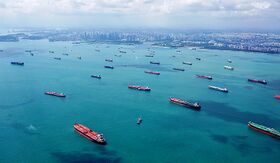Berewan: Difference between revisions
m (→Demographics) |
m (Fix infobox changes) |
||
| Line 12: | Line 12: | ||
| government type = Staggered democratic | | government type = Staggered democratic | ||
| government body = City Council | | government body = City Council | ||
| mayor = | | mayor = | ||
| elevation = 12 | | elevation = 12 | ||
| total area = | | total area = | ||
| urban area = | | urban area = | ||
| metro area = | | metro area = | ||
| time zone = UTC-10 | | time zone = UTC-10 | ||
| population = 6,763,020 | | population = 6,763,020 | ||
| rank = 2nd place | | rank = 2nd place | ||
| density = | | density = | ||
| demonym = Berewanian | | demonym = Berewanian | ||
}} | }} | ||
Latest revision as of 07:05, 11 December 2024
| Berewan べれわん | |
|---|---|
 Berewan has one of the largest ports on Gotha, functioning as essential hub in international container shipping. | |
 Flag |
File:Berecoa1png Coat of arms |
| Location | |
| File:Berelocatormap.png | |
| Country | Sokoku |
| Region | Shuuen |
| Foundation | ~7200 |
| Government | |
| Type | Staggered democratic |
| Body | City Council |
| Physical | |
| Elevation | 12 m |
| Time zone | UTC-10 |
| Population | |
| Total | 6,763,020 |
| Rank | 2nd place |
| Demonym | Berewanian |
Berewan, also spelled べれわん Bahaso, is a Sokokan city located in the state of Shuuen at the northern tip of the island. Thanks to its strategic location on the strait linking the Shangti Ocean with the Julian Sea, it is one of the most important harbor and port cities of Gotha. Fisks Han is using it as one of its main hubs, adding value added logistics and manufacturing to the function as stale port. With 6,8 million inhabitants it is the second largest city of Sokoku.
Etymology
Berewan was first mentioned in a Kamuran shipping log from the late 6900's. From later reports, this port within the Tsuki Integrality was thought to have been located somewhere on the northern tip of Shuuen island, south of Askers Strait.
History
There most probably already was a settlement at this location before the Julian Event in the early 7200's, but so far no physical evidence of such a place has been found. The current history dates back to the 7260's when Helreich built the fortress of Neuwelsen here, guarding the Askers Strait (which at the time was called Neuwelsen Passage). It was built near an existing trading post which the locals referred to as Titik. After the foundation of the Häverist Commonwealth, Helreich started constructing a colonial urbanate here, a planned city focusing on trade with external partners.
Unlike the construction of the two other colonial urbanates in Schangtienrand, which were affected much by local rebellion and later civil war, the more peripheral location of Neuwelsen meant that it could be constructed without much obstruction by violent uprisings. However, building material became a problem here, postponing the completion of several urbanate parts by decades. Also, many parts had to be rebuilt, since the basic design for an urbanate had not been adapted for application in a tropical region. The urbanate delivered poor living conditions because of heat and infestation by malaria mosquitos.
Neuwelsen became a main target for the rebels, supported by Fisks and the Kakuri people, when a conflict between Vittmark and Aedeland broke out in the 7580's. At first, disruption of operations was the main target. But when Kamura took over the northern Fisks islands, Fisks needed a location for their manufacturing and warehousing nearer their southern islands. In 76XX native rebels supported by the Fisks merchant fleet occupied the urbanate and removed the Häverist forces present there.
At first, the settlement was renamed Nyvalla by Fisks (or Nuwara in Shuuen's local language), but a couple of years later, the leadership of the liberated parts of Shuuen proposed renaming the city Berewan, after the port noted in Kamuran logs that should have been located somewhere in the area. Fisks started investing heavily in the city, adding warehousing and manufacturing facilities to the docks and shipyards. Since Fisks wasn't a part of Shuuen at the time, it negotiated the rights for a free port and special economic zone covering about a quarter of the existing urbanate and several hundreds of hectares of undeveloped land adjacent to it.
After the foundation of Sokoku in 76XX, a master plan for the city was drawn aiming at an ambitious 1 million inhabitants by 76XX. A metro railway system with 5 lines was planned and built gradually, but by 76XX it was obvious that the master plan could not keep up with the city's rapid development. A new plan for 2.5 million people with extended lines was presented in 76XX, followed by an even larger plan for 5 million inhabitants shortly after. The blue line was being split into two lines in 76XX and a 7th circular line added in 76XX.
Demographics
TBA
Economy
Berewan is one of the largest ports measured in trade volume on Gotha, but it is always operating in the shadow of Taumakan that is even larger. It has the Fisks Han company to thank for this dominant position. In the early 7600's the company moved much of its manufacturing from its northern islands to this newly liberated port in Shuuen. The city therefore has a maritime, trading and manufacturing characteristic, including container ports, bulk ports, shipyard, assembly facilities and offices. Due to its industrial nature, many smaller and mid-sized companies wanting to supply all of Sokoku or even export choose to settle here, like the car manufacturer Ekusu.